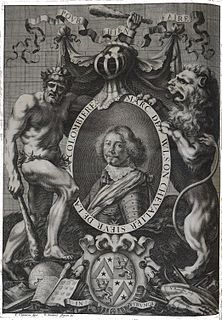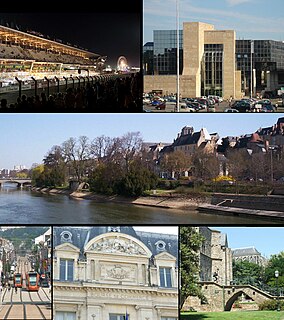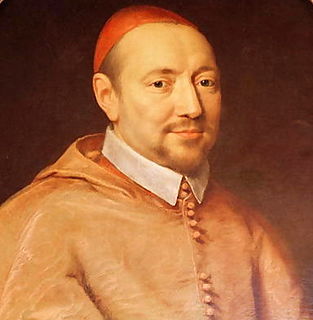Pierre Jurieu was a French Protestant leader.

Jean-Frédéric Osterwald was a Protestant pastor from Neuchâtel.

David-Augustin de Brueys was a French theologian and playwright. He was born in Aix-en-Provence. His family was Calvinist, and he studied theology. After writing a critique of Jacques-Bénigne Bossuet's work, he was in turn converted to Catholicism by Bossuet in 1681, and later became a priest.
Henri de Boulainvilliers was a French nobleman, writer and historian. He was educated at the college of Juilly, he served in the army until 1697.

Jean-Joseph Languet de Gergy was a French ecclesiastic and theologian. He was first bishop of Soissons, then a member of the Académie française, and finally archbishop of Sens.

Marc Vulson de la Colombière (†1658) or Sieur de la Colombière was a French heraldist, historian, poet, minion of the royal court. His name is sometimes spelt as Wulson and also as Volson.
Henri-Irénée Marrou was a leading French historian of the mid-twentieth century. A Christian humanist in outlook, his work was primarily in the spheres of Late Antiquity and the history of education. He is best known for his work History of Education in Antiquity. He also edited the early Christian work Letter to Diognetus for Sources Chrétiennes, a text the only manuscript of which perished in a fire at the University of Strasbourg in the Franco-Prussian War. Marrou edited the collection Patristica Sorbonensia published by Le Seuil. Marrou's work has been criticised by the philosopher Ilsetraut Hadot. Marrou also wrote under the pseudonym of Henri Davenson. His "Carnets manuscrits" were published by his daughter Françoise Flamant in 2006
Jacques Le Fèvre was a French Roman Catholic theologian and controversialist.
Michel, chevalier de Cubières, the brother of Louis Pierre de Cubières, was an 18th-century French writer, known under the pen-names of Palmézaux and Dorat-Cubières, taking the latter name as he had Claude Joseph Dorat as his master.

Jean Hamon was a French doctor and writer of many works on medical and religious subjects. He was born in Cherbourg. A Jansenist, he taught at the Petites écoles de Port-Royal. He died in Paris.
Amable de Bourzeis was a French churchman, writer, hellenist, and Academician.
Émile Poulat, was until 1954 a Catholic priest, associated with the Prêtres Ouvriers movement, and thereafter a French historian and sociologist. Director of Studies at the École des hautes études en sciences sociales, he was also director of research at CNRS and historian of the contemporary church. He was a founding member of the Group of Sociology of Religion, director and member of the editorial boards of several journals including Politica Hermetica. His research concentrated on the conflict between Catholic culture and modern culture in the history of contemporary Catholicism.
Henri Basnage de Beauval was a French Huguenot historian and lexicographer, known also as a journal editor.
Charles Le Cène (1647?–1703) was a French Huguenot controversialist, in exile in England and the Netherlands after 1685.
Isaac Jacquelot (1647–1708) was a French Huguenot minister and controversialist.
Barthélemy Mercier de Saint-Léger was a French abbot and librarian.

The Temple du Marais, sometimes known as the Temple Sainte-Marie, or historically, as the Church of Sainte Marie de la Visitation, is a Protestant church located in the 4th arrondissement of Paris, in the district of Le Marais at 17 Rue Saint-Antoine. It was originally built as a Roman Catholic convent by the Order of the Visitation of Holy Mary, whose sisters were commonly called the Visitandines. The church was closed in the French Revolution and later given to a Protestant congregation which continues its ministry to the present. The closest métro station is Bastille

Nicolas Lenglet Du Fresnoy was a French scholar, historian, geographer, philosopher and bibliographer of alchemy.
Amédée Henri Gustave Noël Gastoué was a French musicologist and composer.
Matthieu Bochart was a French Protestant minister at Alençon from 1635-1662.










